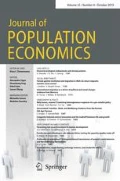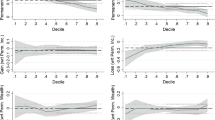Abstract
The paper investigates into the determinants of the personal distribution of income and wealth. In an overlapping generations model all individuals are assumed to be identical except for their inherited wealth. Since life time is random the bequest of an individual and thus the inherited stock of capital of its children are stochastic variables. Taxation and social security contributions affect life cycle savings, bequests, and, eventually, the distribution of income and wealth in the society. It is shown that, in general, higher tax rates reduce distributive inequality as long as the rate of interest is exogenously given. In steady state, however, where the rate of interest is determined endogenously, increasing taxation and higher social security payments both diminish the capital labor ratio so that the rate of interest rises. If this interest effect is strong enough then it may outbalance the tendency toward more equality because higher interest rates enhance initial differences in the distribution of both income and wealth and, eventually, the inequality in the distribution of income and wealth in the society.
Similar content being viewed by others
References
Abel AB (1985) Precautionary saving and accidental bequests. Am Econ Rev 75:777–791
Bevan DL, Stiglitz JE (1979) Intergenerational transfers and inequality. Greek Econ Rev 1:8–26
Blinder AS (1973) A model of inherited wealth. Q J Econ 87:608–626
Eckstein Z, Eichenbaum MS, Peled D (1985) The distribution of wealth and welfare in the presence of incomplete annuity markets. Q J Econ 100:789–806
Fisz M (1980) Wahrscheinlichkeitsrechnung and Mathematische Statistik. VEB Verlag Deutscher Wissenschaften, Berlin
Hurd MD (1987) Savings of the elderly and desired bequests. Am Econ Rev 77:298–312
Hurd MD (1989) Mortality risk and bequests. Econometrica 57:779–813
Kotlikoff L, Summers L (1981) The role of intergenerational transfers in aggregate capital accumulation. J Polit Econ 89:706–732
Schwödiauer G, Wenig A (1989) Accidental bequests, social security and the distribution of wealth. In: Felderer B (ed) Einkommensverteilung and Bevolkerungsentwicklung. Duncker & Humblot, Berlin
Straub M, Wenig A (1984) Human fertility and the distribution of wealth. In: Steinmann G (ed) Economic consequences of population change in industrialized countries. Springer, Berlin Heidelberg New York, pp 68–86
Straub M, Wenig A (1987) On the construction of an index of bequest behavior. In: Eichhorn W (ed) Measurement in economics. Physica, Heidelberg, pp 453–476
Thurow LC (1975) Generating inequality mechanisms of distribution in the US Economy. Basic Books Inc., New York
Tomes N (1981) The family, inheritance, and the intergenerational transmission of inequality. J Polit Econ 89:928–958
Wold HOA, Whittle P (1957) A model explaining the pareto distribution of wealth. Econometrica 25:591–595
Yaari ME (1965) Uncertain lifetime, life insurance, and the theory of the consumer. Rev Econ Stud 32:137–150
Author information
Authors and Affiliations
Rights and permissions
About this article
Cite this article
Schwödiauer, G., Wenig, A. The impact of taxation on the distribution of wealth in an economy with changing population. J Popul Econ 3, 53–71 (1990). https://doi.org/10.1007/BF00160417
Received:
Accepted:
Issue Date:
DOI: https://doi.org/10.1007/BF00160417




